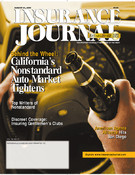Last August, American Re, a subsidiary of Germany’s Munich Re-the world’s biggest reinsurer-agreed to acquire American Insurance Service Inc. (AIS) and its United National Group (UNG) with assets of an estimated $500 million. Although the all-stock deal was straightforward from a business perspective, it immediately raised controversial social and political issues.
As UNG is headquartered in Bala Cynwyd, Pa., American Re’s bid required the approval of the Pennsylvania Insurance Department to complete the transaction. Soon after the announcement, Commiss-ioner Diane Koken and the Department asserted that in order to protect Pennsylvania residents-specifically victims of Nazi persecution and their heirs-they were reluctant to approve the transaction. The reason: Munich Re’s refusal to join the International Commission on Holocaust Era Insurance Claims (ICHEIC), which is investigating unpaid claims dating from the World War II era.
On Aug. 11, AIS gave notice to American Re that the deal was off. “The owners terminated the agreement due to the continued refusal of the Pennsylvania Insurance Department to rule for more than ten months on American Re’s application for approval to acquire control of UNG, the uncertainty as to when litigation over the Department’s refusal would be resolved and whether the Department would then approve the transaction, and the resulting impediments this delay and uncertainty presented to strategic planning for UNG and its current ownership,” the company stated.
“This transaction was structured nearly a year ago and changing business and market conditions since then, and during any further delay, present risks and challenges to UNG that can no longer be left on hold.”
American Re, while expressing disappointment with the decision, shared AIS’ concerns that the delay seriously threatened UNG. “We agree, however, that no company can remain in limbo for an extended and indefinite period, so we understand United National’s decision,” the company stated. Both groups pledged to continue working together in the future.
Given the intractable opposition of Commissioner Koken-who also serves as an ICHEIC alternate member-and her department, the acquisition was perhaps doomed from the outset. Nevertheless, American Re, having received requisite approvals in Indiana and Wisconsin, instituted legal proceedings against the Pennsylvania Insurance Department in February in an effort to force it to make a decision.
It actually won the first round in the Commonwealth Court, when Judge Joseph Doyle ordered the Department to make a decision within 17 days, but his ruling was appealed on June 15, and the Superior Court ordered further hearings, findings of fact and granted a stay of the order. Facing further lengthy delay and uncertainty, the deal collapsed.
This circumstance is not an isolated case. Fifty-five years after the end of the Second World War, Holocaust victims-and, perhaps more importantly, their heirs-have asserted numerous claims against European insurers, both directly and as successors of former insurers. ICHEIC, under the direction of former Secretary of State Lawrence Eagleburger, has taken significant steps to resolve disputes over denial of coverage or failure to pay claims on Nazi-era policies. Almost all the companies with potential liabilities, including Allianz, AXA, Generali, Winterthur, Zurich Allied and recently the entire Dutch Insurance Association, have joined the panel.
Reinsurance companies, however, have been reluctant to do so. Munich Re, in a letter to the panel last January, stated: “Munich Re never issued any insurance policies, does not have any relevant insurance policy records, and does not control any insurers which issued insurance policies in Europe during the Holocaust era.”
The company has, however, expressed willingness to live up to its “moral responsibility” for crimes committed by the Nazis. It participates in the German Foundation Initiative and has promised full cooperation to investigators.
Unfortunately these initiatives weren’t sufficient to satisfy Pennsylvania’s Insurance Department.
Topics Pennsylvania
Was this article valuable?
Here are more articles you may enjoy.


 Allstate CEO Wilson Takes on Affordability Issue During Earnings Call
Allstate CEO Wilson Takes on Affordability Issue During Earnings Call  Zurich Insurance’s Beazley Bid Sets the Stage for More Insurance Deals
Zurich Insurance’s Beazley Bid Sets the Stage for More Insurance Deals  Charges Dropped Against ‘Poster Boy’ Florida Contractor Accused of Insurance Fraud
Charges Dropped Against ‘Poster Boy’ Florida Contractor Accused of Insurance Fraud  Longtime Alabama Dentist Charged With Insurance Fraud in 2025 Office Explosion
Longtime Alabama Dentist Charged With Insurance Fraud in 2025 Office Explosion 


